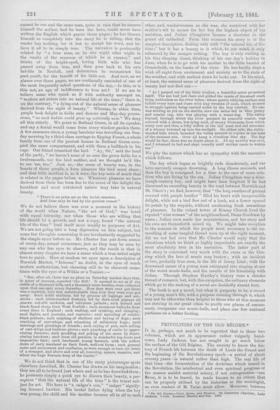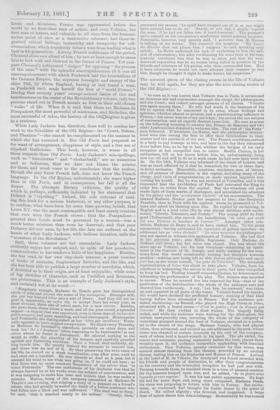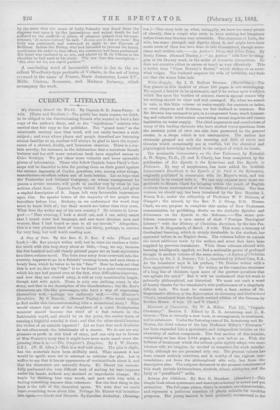FRIVOLITIES OF THE OLD REGIME.*
IT is, perhaps, not much to be regretted that in these two volumes, which are in appearance rather vulgarly hand- some, Lady Jackson has not sought to go much below the surface of the Old Regime. The anxiety to know the his- tory of French life between the death of Louis the Grand and the beginning of the Revolutionary epoch—a period of about seventy years—is natural rather than high. The real life of that time—the fermentation of the doctrines which issued iu the Revolution, the intellectual and even spiritual progress of the masses amidst material misery, if not retrogression—can fever, it is to be feared, be made known to an extent that can be properly utilised by the historian or the sociologist, as even readers of M. Taiue must allow. Moreover, between * The Old Regime—Court, Salome, and Theatres. By Catherine Charlotte, Lady Jaekson. 2 vole. London: Bentley and Son. 1880. Louis and Mirabea,u, France was represented before the world by no first-class man of action, and even Voltaire, her first man of letters, and valuable to all time from the humani-
tarian point of view as a destructive reformer, had those in- grained ethical failings, insincerity and incapacity for self- renunciation, which hopelessly debar a man from leading what is best in his generation. ,Among French politicians of the period, Choiseul alone saw ahead of him ; he saw at least enough to cause him to look with sad distrust to the future of France. Yet com-
pare Choiseul's antiquated " dodges" for opposing "the process of the suns" with the splendid unscrupulousness (if it was all unscrupulousness) with which Frederick laid the foundations of the German Empire, the supreme foresight and energy of the elder Pitt, by whom England, having at last found a man, as Frederick said, made herself the first of " world-Powers.'' During that seventy years' ennuye-menuet dance of vice and heartlessness on the crater of the Revolutionary volcano, only two
persons stand out in French annals as first in their self-chosen " walks " of life. When it is said that these are Madame de Pompadour, the most powerful of mistresses, and Richelieu, the most successful of rakes, the history of the Old:Regime is given in a sentence.
While Lady Jackson has, therefore, done well to confine her
work to the frivolities of the Old Regime—its "Court, Salons, and Theatres "—she cannot be complimented on the manner in which she has executed it. Her Old Paris had prepared us for want of arrangement, sloppiness of style, and a free use of slipshod Gallicisms. This book, however, is worse in all these respects than Old Paris. Lady Jackson's mis-spellings, such as " histoirettes " and " rhubarbatif," are so numerous
and so ludicrous, that we dare not blame the printer for them, and must come to the conclusion that the author,
though she may know French talk, does not know the French language. In the Old Regime, unfortunately, she soars higher than in Old Paris, and in consequence, her fall is all the deeper. She attempts literary criticism, the quality of
which is, perhaps, sufficiently indicated. by her statement that Diderot is " repelling." Indeed, the sole outcome of read- ing this book for a serious historical, or any other purpose, is to confirm, what have been for some time growing beliefs, that Louis XV. was the most contemptible and least manly creature that ever wore the French crown ; that the Pompadour— granted that Louis must be governed by a woman—was a much better mistress than even he deserved; and that poor Dubarry did not earn, by life, the fate she suffered at the hands of what Lady Jackson, with tedious iteration, calls the "monsters of the Revolution."
Still, these volumes are not unreadable. Lady Jackson evidently enjoys her subject, and, in spite of her gaucheries, communicates to her readers a little of her happiness. Besides, she has read, in her own slap-dash manner, a great number
of books of memoirs, fragmentary histories, and the like, and she has been able to publish a large number of anecdotes, which, if doubtful as to their origin, are at least enjoyable; while some of lug sketches of character, such as Crebillon and Rousseau, are picturesque, This is au example of Lady Jackson's style, and certainly not at its worst :-
" Singularly enough, Madame do Tenpin gave her distinguished circle of wits and literati the name of the rad nagerie. Stranger still, she put her learned Wes into a sort of livery. And they did not re- gard it, apparently, as infra dig. to acoopt from her every year, as their etrennes, three ells of velvet each, for a new culotte. Besides, she gave them, three times a week, and all the year round, a splendid supper—a supper that was renowned, even in those days of recherchds petits-soupers, and pure, sparkling, and iced champagne. Montesquieu and Fontanelle she distinguished as her ' b6tes par excellence.' Fonta- nelle appears to have supped everywhere. He dined every Thursday at Madame do Lambert's, elsewhere probably on other days, and took his ' the a l'Angaiss ' (than beginning to be fashionable) in any .salon where he found it introduced. He allowed nothing in the world to ruffle the placidity of his temper, and carefully guarded against any disturbing emotions. Once a friend died suddenly, sit- ting beside him. He quietly desired his servants to remove him, and there was an end of it. By thus preserving the even tenor of his life, he coaxed on a weak constitution, year after year, until ho had eked out a hundred. He was already as deaf as a post, but it amused his mind to see what was going on, if he could not hoar ; so that there was no more constant frequenter of the salons than ' le vieux Fontenelle.' The one misfortune of his deafness was that he always fancied he or his works were the subject of conversation, and it was fatiguing to make him hear and believe that he was under a mistake. Mairan, being of the company assembled at Madame as Tenoin's one evening, was relating a story of a peasant on a friend's estate, who had greatly bewailed the death of a follow-workman who had fallen into a ditch and was suffocated. The mud was so deep,' 'tie said, that it reached nearly to his ankles." Surely, then,'
answered the master, ho could have stepped out of it, or you might
have assisted him to do so.' Surely, es you say, I might,' replied the man, if he had not fallen into it head-foremost.' The peasant's naive remark on his companion's misfortune raised general laughter. Fontenelle, however, very gravely said, I perceive that M. Mairau is talking of my works.' This renewed the laughter. ' My 2'raitti des blondes does not please him, I suppose,' ho said, speaking very sulkily. La Motte undertook the task of explaining to him the sub- ject of conversation ; but after vociferating for some time in his ears, scarcely convinced him that he was in error, and that his well- deserved reputation was by no means being called in question by the friends and admirers of his genius, who then surrounded him. Had it been otherwise, he would not have allowed their censure to fret him, though he thought it right to make known his suspicions."
The account given of the closing events in the life of Voltaire may be told again, for they are also the true closing scenes of
the Old Regime :— " As soon as it was known that Voltaire was in Paris, it occasioned
an immense stir and commotion amongst the clergy, the philosophers, and the Court ; and indeed amongst persons of all classes. 'Voltaire was again among them !' He who had made it the business of his life to uproot what he conceived to be error, whose feelings and opinions, whether absent or present, had a predominating influence in France,—his name was on every ono's lips ; his arrival the one subject of conversation, and all eagerly desired to see him. He rose at seven on the following morning to receive the Prince de Beauvau and two other Academicians deputed to welcome him. The rest of the Forty' soon followed. D'Alembert, La Harp, and the philosophic brother- hood were also among the first to offer their felicitations to their master and the patriarch of the sect. The French comedians arrived in a body to pay homage to him, and later in the day they rehearsed
Irene before him, as he lay in bed, whither the fatigue of his early reception at last compelled him to retire. Madlle. Clairon, in her enthusiasm, fell on her knees before him, he, unfortunately, being now too old and stiff to do as in such eases he had over been wont to do. On the 12th, Voltaire was informed of the death of Lokain, and was so much affected by it that he remained, for two or three days, in strict seclusion. Meanwhile, courtiers, ministers, men of letters, and all persons of distinction in the capital, including many of the clergy, paid visits of congratulation, or made anxious inquiries con- cerning his health. But he was not received at Versailles, and it was rumoured that the Archbishop of Paris had entreated the King to order him to retire from the capital. But the vivacious old poet made light of these marks of disrespect, and astonished his admirers by his gaiety and the prodigieuse 104rch F' of his conversation. The learned Madame Necker paid her respects to him ; also Benjamin Franklin, then in Paris with his nephew, whom he presented to Vol- taire and asked his blessing upon him. He replied by exclaiming, iu English and in a loud voice (for he was almost delirious with excite- ment), 'Liberty, Tolerance, and Probity !"rho young Abbe de Peri- gord (Talloyrand), also craved the benediction, ' de celui qui avait 8t6 our Nations is bandeau de l'erreur."' Amongst other cele- brities, Madame du Barry is said to have visited him. To her groat amusement—having exhausted his repertoire of gallant speeches—he addressed her as votre divinite." La mire nottl.rice des philosophes' was not spared to witness this apotheosis of Voltaire. She had died in the previous year ; also Mdllc. Espinasse. Only Madame du Doffand still lived ; but her salon was closed. She was about the same age as Voltaire, but far less vivacious—inhabiting an apart- ment in the Convent of St. Joseph, and while waiting for her sum- mons from this world occasionally turning her thoughts towards another—nothing now being left to this femme philosophe and esprit fort but, as she wrote herself, pear de Veto-mite.' The sixteenth representation of Irdne was about to take place. Voltaire, from his exertions in instructing the actors in their parts, had been compelled to keep his bed. Finding himself somewhat:bettor, he determined on witnessing the performance of his play. The theatre was crowded to excess. When he entered the box reserved for him—that of the gentlemen of the bodehamber—the whole of the audience rose and cheered him vociferously. A cry, Let him be crowned,' was taken up and repeated in all parts of the house. Voltaire bowed his thanks, but would have declined the proffered honour; nothing of that kind having before been attempted in Franco. But the audience per- sisted, exclaiming—as Buzard, who played the High Priest in Irene, advanced with a laurel crown—' Cut is public ; c'est la France gui l'envoie.' He then yielded to their wishes. The tragedy being ended, and while the audience were waiting for the after-piece, the curtain unexpectedly rose, revealing the whole of the company of comedians grouped around the bust of Voltaire, elevated on a pedes- tal in the centre of the stage. Madame Vestris, who had played drone, than advanced, and recited an ode addressed to the poet, whose name was chanted at certain intervals by the rest of the company, each of whom hold a laurel-wreath in his hand. The ode ended, the actors and actresses, passing separately before the bust, placed their wreaths upon it, the audience meanwhile applauding this scef scene, enthusiasm. Poor Voltaire, greatly overcome b carried almost fainting from the theatre, preceded by an excited throng, hailing him as the Sophocles and Homer of France. Arrived at the hotel of M. de Villotte, the courtyard was found crowded with his friends and people of distinction, to offer their congratulations on his recovery and the triumphal reception he had just met with. Turning towards them, ho thanked them in a tone of unusual emotion for the honours heaped upon him, and he added, de la gloire sous laquelle je vans evpirer.' it was his last public appearance. He kept his bed for some days, and, being more composed, Madame Denis, his niece was proposing to return with him to Forney. But excite- ment, so continued, had brought his feeble frame to the gates of death. He rallied slightly ; was feverish and impatient. A. large dose of opium threw him into a lethargy. Momentarily he was roused
by the news that the name of Lally-Telamlal was freed from the disgrace cast upon it by the ignominious and unjust death ho had suffered on the scaffold—a gleam of pleasure passed over his coml.
tenance, meurs content,' he said. Te vois que le Bei est juste.' His body was embalmed, and conveyed at night to the Convent. of SellThres. Before the Bishop, who had intended to prevent his burial, could issue his order to that effect, the ceremony had been performed. His heart was enclosed in an urn, and placed by M, do Villette in the chamber he had used as his study. The urn bore this inscription,- ' Bon mar est ici, son esprit partout.' " A concluding word of favourable notice is due to the ex- cellent Woodbury-type portraits of Voltaire, in the act of being crowned in the name of France, Marie Antoinette, Louis XV., Clairon, Rousseau, and Madame Dubarry, which accompany the work.




































 Previous page
Previous page